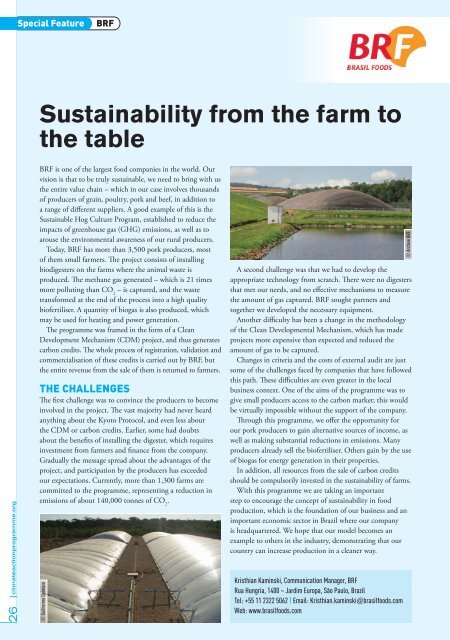Climate Action 2011-2012
Create successful ePaper yourself
Turn your PDF publications into a flip-book with our unique Google optimized e-Paper software.
special Feature<br />
BRF<br />
Sustainability from the farm to<br />
the table<br />
26 climateactionprogramme.org<br />
BRF is one of the largest food companies in the world. Our<br />
vision is that to be truly sustainable, we need to bring with us<br />
the entire value chain – which in our case involves thousands<br />
of producers of grain, poultry, pork and beef, in addition to<br />
a range of different suppliers. A good example of this is the<br />
Sustainable Hog Culture Program, established to reduce the<br />
impacts of greenhouse gas (GHG) emissions, as well as to<br />
arouse the environmental awareness of our rural producers.<br />
Today, BRF has more than 3,500 pork producers, most<br />
of them small farmers. The project consists of installing<br />
biodigesters on the farms where the animal waste is<br />
produced. The methane gas generated – which is 21 times<br />
more polluting than CO 2<br />
– is captured, and the waste<br />
transformed at the end of the process into a high quality<br />
biofertiliser. A quantity of biogas is also produced, which<br />
may be used for heating and power generation.<br />
The programme was framed in the form of a Clean<br />
Development Mechanism (CDM) project, and thus generates<br />
carbon credits. The whole process of registration, validation and<br />
commercialisation of these credits is carried out by BRF, but<br />
the entire revenue from the sale of them is returned to farmers.<br />
The challenges<br />
The first challenge was to convince the producers to become<br />
involved in the project. The vast majority had never heard<br />
anything about the Kyoto Protocol, and even less about<br />
the CDM or carbon credits. Earlier, some had doubts<br />
about the benefits of installing the digester, which requires<br />
investment from farmers and finance from the company.<br />
Gradually the message spread about the advantages of the<br />
project, and participation by the producers has exceeded<br />
our expectations. Currently, more than 1,300 farms are<br />
committed to the programme, representing a reduction in<br />
emissions of about 140,000 tonnes of CO 2<br />
.<br />
© Guilherme Dalmazo<br />
A second challenge was that we had to develop the<br />
appropriate technology from scratch. There were no digesters<br />
that met our needs, and no effective mechanisms to measure<br />
the amount of gas captured. BRF sought partners and<br />
together we developed the necessary equipment.<br />
Another difficulty has been a change in the methodology<br />
of the Clean Developmental Mechanism, which has made<br />
projects more expensive than expected and reduced the<br />
amount of gas to be captured.<br />
Changes in criteria and the costs of external audit are just<br />
some of the challenges faced by companies that have followed<br />
this path. These difficulties are even greater in the local<br />
business context. One of the aims of the programme was to<br />
give small producers access to the carbon market; this would<br />
be virtually impossible without the support of the company.<br />
Through this programme, we offer the opportunity for<br />
our pork producers to gain alternative sources of income, as<br />
well as making substantial reductions in emissions. Many<br />
producers already sell the biofertiliser. Others gain by the use<br />
of biogas for energy generation in their properties.<br />
In addition, all resources from the sale of carbon credits<br />
should be compulsorily invested in the sustainability of farms.<br />
With this programme we are taking an important<br />
step to encourage the concept of sustainability in food<br />
production, which is the foundation of our business and an<br />
important economic sector in Brazil where our company<br />
is headquartered. We hope that our model becomes an<br />
example to others in the industry, demonstrating that our<br />
country can increase production in a cleaner way.<br />
Kristhian Kaminski, Communication Manager, BRF<br />
Rua Hungria, 1400 – Jardim Europa, São Paulo, Brazil<br />
Tel: +55 11 2322 5062 | Email: Kristhian.kaminski@brasilfoods.com<br />
Web: www.brasilfoods.com<br />
© Archive BRF












